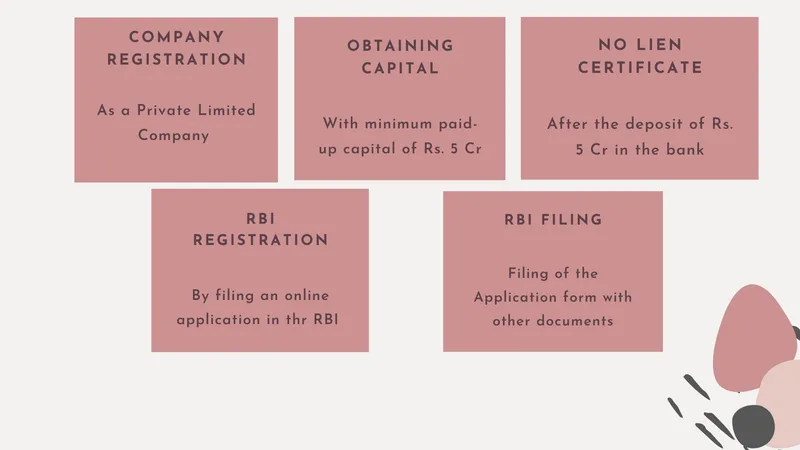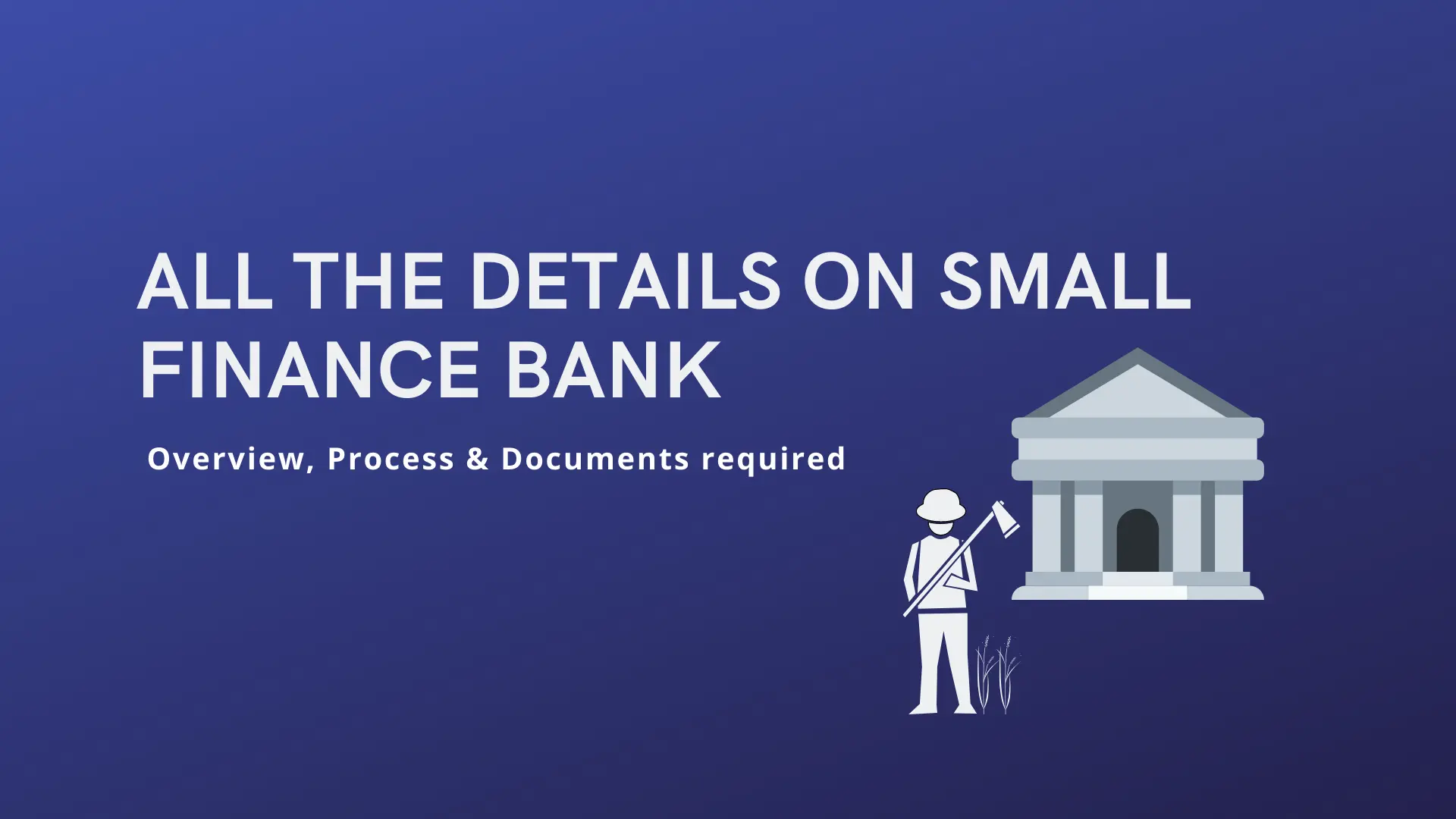

How to start a Small Finance Bank?
The article is all about small finance bank, its procedure, types and how exactly to start a small bank.

Overview
A finance company or a bank serves a group of individuals by providing loans, accepting deposits and indulging into other bank related activities.
Small Finance Companies or Banks (SFB) / Micro-Finance Institutions(MFI) are categorised as one of the types of a niche bank. They work towards expanding their financial expansion by undertaking certain banking activities. The three basic services they provide – Loans, Credit and Insurance.
What is a niche bank?
A niche bank is established for the purpose of fulfilling the demographic needs of a particular group of individuals. Niche banks work towards making modifications in the bank’s major activities such as its advertisements, services according to a particular group of customers and their preferences.
Small finance banks are a specific category of banks that are established by RBI under the guidance of Government of India.
Purpose
The objective of such banks is to solve financial issues of the rural as well as semi-urban areas like small business establishments and startups, small and micro farmers that find it difficult to survive with low incomes, small manufacturing industries and households with low income.
The reason of supporting these groups is because they are not in a position to lend from banks that demand high interest rates and place several other conditions that are hard to fulfil.
The registration of Small finance banks is done as a Public Limited Company as per the Companies Act, 2013 and is granted license under Section 22 of the Banking Regulation Act, 1949.
Since it is provided a license as per the Banking Regulation Act,
It is governed by-
- The provisions of the the Banking Regulation Act 1949
- Reserve Bank of India Act, 1934 and with other relevant Acts
- Directives/Regulations
- Guidelines/Instructions issued by RBI and other regulators.
How to start a Small Finance Bank (SFB)?
The two common two steps that every business needs to take before establishing-
- Have a business plan
- Meet funding requirements
A small finance bank can be started in two ways –
- Profit-making corporation,
- Non-Profit making corporation
Small Finance Bank through Section 8
Small Finance Bank through Section 8 company comes under a non- profit micro-finance business.
Features
- It is exempted from RBI approval, as compared to other banks and NBFCs.
- The Registration process is easy and cheap
- Lesser compliances as compared to the NBFC – MFI
- Unsecured loans that could be granted to the small businesses could be up to Rs. 50,000.
- Loans for dwelling residence could be up to Rs. 125,000.
- There is no minimum ceiling on raising funds
- Obtain small finance bank license under Section 8 of the Companies Act, 2013.
- Public deposits are not accepted at such banks
- RBI guidelines on interest rates and processing charges must be strictly followed.
- The interest rates should not exceed the limit of 26%.
- The processing charge should not be more than 1% of the Gross Loan Amount.
- A loan can be granted depending on the limits as mentioned in the guidelines.
Registration process
The steps to be followed before starting a small Finance bank in India through Section 8 are –
- Obtain DSC and DIN.
- A Minimum of two Directors are required to incorporate a Section 8 company.
- Apply for the proposed name approval.
- After the proposed name is approval, the next step is to apply for the Central government license. Other essential documents has to be prepared including the income and expenditure account.
- The Central Government may grant approval if the application meets all the criteria. After the approval of the application, the individuals need to apply for incorporation, after the approval of which, the company is issued an incorporation certificate.
- Apply for PAN and TAN, after the company is formed.
Small Finance Company as NBFC
Documents Required
- The Director's/Shareholder should provide a proof of their respective Incomes
- The Net Income Certificate of the Directors, Shareholders and the Company
- The Credit Report of the Directors and the Shareholders
- MOA & AOA of the NBFC that describes the Financial, Investment or the Lending business.
- Company Incorporation Certificate
- Acquire a Banker's Certificate of No Lien that supports Net Owned Funds (NOF) of Rs 5 Cr
- Banker's Report about the Company and its group
- Director's Education/Professional qualification proof, along with proof of work experiences in the financial services sector field.
- A detailed action plan about the bank services it is going to undertake, and the policies that will regulate the bank’s functions.
- Organisation's Structure Plan.
- Decision-making process for the Approval or Rejection of a Loan Application.
- Board Resolution agreed in favour of NBFC formation.
Registration Process
Register the Company
The registration of a company is essential before taking any other steps. The company should be registered as a Private Limited Company or a Public Limited Company, India.
Obtaining Capital
A minimum paid-up capital of Rs. 5 Cr is mandatory for an NBFC Registration.
Certificate of No Lien
Rs. 5 Cr must be deposited as a Fixed Deposit in the bank which will then issue a Certificate of No Lien.
Register with RBI
The next step is to file an Online Application with RBI to get the NBFC started as a Small Finance Company in India.
Once the Application has been submitted, the company will receive a Company Application Reference Number (CAR).
Filing with the RBI
Once the Application has been filed, a hard copy of the Application, along with the important documents, are to be submitted to the Regional Office of the Reserve Bank of India.

How do they earn?
The Small Finance Banks collect money from the savings and current account depositors, fixed depositors, commercial papers, wholesale depositors, refinancing etc.
- On saving accounts, they offer interest rates between 6% to 7%, considering certain conditions.
- On fixed deposits around 9%, interest is offered.
- SFBs offers two types of major loans - Group Loans & individual loans.
- The loans can be further differentiated into agricultural loans, education loans, home improvement loans, home purchase loans, livestock loans etc.
- SFB’s do not get any guarantee against the loans they offer unlike other banks.
Rules & Regulations of Small finance banks
- Small finance banks can only carry on banking activities of lending loans and accepting deposits for the undeserved and unprivileged sections of the society.
- It provides banking services to boost savings of individuals.
- The purpose of Small finance banks will be to support the small farmers, manufacturing factories and businesses by giving them access to the latest technology and techniques that require low cost to function.
- They are established as a public limited company but in the private sector, which is then promoted by individuals, trust or societies.
- They are governed by the provisions of the the Banking Regulation Act 1949, Reserve Bank of India Act, 1934 and with other important Acts.
- Small finance banks are considered as non-scheduled banks, which means that they are not permitted to borrow funds from the Reserve Bank of India like the other scheduled banks.
Conclusion
The requirement of small finance banks/ micro-finance company is increasing considering the fact that a major percentage of people are surviving on low incomes. People living in the country are not in a position to even lend loans from banks due to their inability to pay back and to eliminate this issue, an institution like a micro-finance company is an absolute necessity.



![Microsoft Excel: [SOLVED] Excel File Slow To Respond Issue](https://images.yourstory.com/assets/images/placeholder.png)


